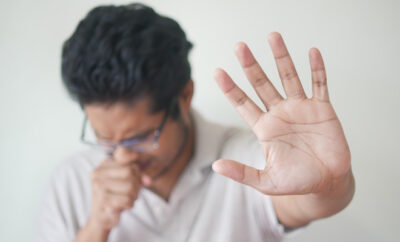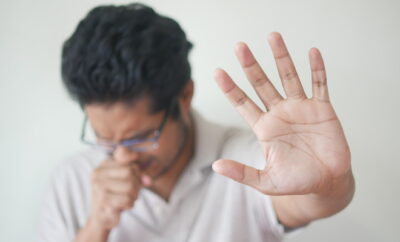
Health x Wellness
Sneezing? Could it be allergies? Should I be worried ?
In this New Year, peoples around the world engage in spring cleaning during their respective New Years. From Lunar New Year celebrated by the Chinese to Khaneh-Tekani, celebrated by those in central Asia and the Middle East.
What is common between these celebrations across people and cultures is the activity of spring cleaning. This task of cleaning up one’s house, to rid of “bad luck”, sweeping away the old and allowing the new to come, is one massive feat. And as one gets into this rhythm of spring cleaning, a sudden “AH CHOO!” may fill the entire room.
Does this sound too familiar? As the eyes start to water and the search for tissue paper to stop the runny nose continues, you persist in the spring cleaning to find that the symptoms simply do not abate! At this point in time, a million and things pop into your mind: “What is going on?”, “Have I picked up the Flu?” and lastly, “could this be an allergy?”
What is going on?
Well my dear reader, if you find yourself sneezing and wondering what it could all mean, I hope that in the next few minutes, I can shed some light on this phenomenon and the possible causes that might lead up to it.
Before we conclude that someone is thinking of you, sneezing occurs as a result of the nasal passages irritated. This could either be from viruses infecting the airways or even the presence of allergens. These allergens include physical irritants such as cigarette smoke or even polluted air. The body then releases chemicals known as histamines in response to these irritants, resulting in the triggering of the nerve endings and subsequently a sneeze. The sneeze is the body’s mechanical way of expelling the irritants from the nasal passages.
Could this be the flu?
But doctor, I am still sneezing and my question has not been answered yet. Could this be the flu or cold? I am glad you asked because this is the main point I would like to address as well: that if the sneezing is something persistent (more than a week) AND if you have symptoms of fever, cough as well, this could all point towards a respiratory tract infection or what we call the cold or flu.
I will not dive into details regarding a respiratory tract infection in this article but if the constellation of symptoms above persist for more than 3 days then it is advisable to see your doctor for an accurate diagnosis and treatment.
There are accurate point of care testings that are done in the clinic by your doctor that can help determine within 30 mins whether it is a viral respiratory tract infection or a bacterial one and subsequently give you the medications that you need.
Is it possible to develop an allergy to cleaning or during cleaning?
What Is An Allergy?
An allergy is where the person’s own immune system reacts too strongly against substances that other people do not normally react to.
These substances or allergens can include anything from house dust mites, pollen, molds (fungi), pet danders, insect sting/bites, or certain type of medicines and foods.
This overreaction by the immune system is unfortunately more common with a personal history of allergy. This can be in the form of a sensitive nose, sensitive skin or even sensitive airways.
The biochemical reaction that occurs in this overreaction by the body results in the production of IgE antibodies and the release of the chemical called histamine. This histamine chemical then causes the common allergic symptoms which include:
- Rashes (eg. eczema flare ups),
- Hives/urticaria,
- Swelling of face/ lips/around the eyes,
- Throat and tongue,
- Runny or blocked nose,
- Itchy watery eyes,
- Abdominal pain,
- Vomiting, and diarrhoea,
- Wheezing,
- Asthma,
- and even difficulty in breathing.
These uncomfortable and distressing symptoms tend to occur 1-2 hours after exposure to the irritant or allergen. And in some cases, allergic reactions can be potentially life threatening resulting in a condition known as anaphylaxis.
Anyone who has had an anaphylaxis before, especially due to food allergy are encouraged to carry a medication with them around, known as an Epipen injection. This allows for the immediate administration of the medication where a delay can be almost fatal. Therefore, it is extremely important to identify the source of the trigger and avoid them religiously!
How then do We Test For Allergy?
To find out what you are allergic to, causing your sneezing or even to avoid a situation of anaphylaxis, 2 commonly used techniques are employed to detect allergies. An IgE blood test or a skin prick test. These cover environmental allergies and even food ingested allergies.
Wait what a skin prick test? That sounds painful!
This is a simple, quick and accurate test to diagnose allergy and the results can be known on the same day within 15-20mins!
Contrary to the name of the test sounding painful, small amounts of allergens are introduced into the skin where your doctor will use a lancet that barely penetrates the skin surface to induce a specific skin reaction – a red raised itchy bump, also known as a wheal.
These wheals would then be measured against the control where a size of 3mm or more indicates an allergic reaction. The test is safe and accurate but there are some caveats where if a patient has taken medications such as antihistamines within the week or even those with a history of life threatening anaphylaxis – this skin prick test may not be suitable for them and a blood test would be more ideal.
How the Skin prick test is usually done
Small markings will be drawn on skin and tiny drops of allergens applied onto the skin. The allergens are introduced into the skin via tiny lancets that barely penetrates the skin surface.
This blood test also known as the IgE blood test would pick up IgE antibodies against the allergens with no special preparation required. Sometimes both the IgE blood tests and skin prick tests are done in the same setting to correlate the findings as well.
How do I Stop Sneezing !!
In this case where the sneezing is caused by allergy, there are 3As which would be helpful in our fight against allergy.
A – Avoidance of allergen.
Most of the time, this is not feasible, especially if your environment contains the offending allergen. Whilst a HEPA filter air purifier may decrease the amount of allergen in the environment, some people may still have an allergic response to the remaining amounts.
A – Anti allergic medications (anti-histamines)
The next stay of treatment involves tablets such as antihistamines, nasal sprays and even steroids to ease the symptoms. However these do not cure the underlining trigger of allergies just the control of symptoms.
A – Answer to allergy – Sublingual immunotherapy
This is the only way to cure the body of allergies by introducing a low dose of allergen daily, and in turn telling the body that these allergens are not the enemy, thereby reducing the overreaction to them.
Sublingual immunotherapy significantly improves quality of life, reduces consumption of medications, and also reduces risk of developing asthma and new allergies in the future.
Clinical papers show success rates of SLIT up to 80% especially for inhaled allergens.
Improvement of symptoms can be seen as early as 2-3 months from start of the therapy. It is recommended duration of treatment is 3-5 years, hence, a firm commitment from the patient is necessary to help determine the success of treatment. Persistent effects from immunotherapy have been documented to last up to 10 years.
Symptoms can relapse if treatment is stopped prematurely.
How Safe is SLIT?
Sublingual immunotherapy is safe for children as young as 2 years old. Only about 1% of patients report temporary mild itching/ tingling under the tongue which resolves within 1 week.
SLIT is strongly recommended in World Allergy Organization (WAO) clinical studies.
I hope that this 3A approach can shed light to your active management of your allergies. If sneezing is something that is hindering your quality of life, speak to your doctor today to see how he can work with you to alleviate your symptoms of allergies today.
Article contributed by Dr Julian Hong, resident physician, DTAP Clinic.
Dr Tan & Partners clinic (DTAP Clinic) was established in 2005 at Robertson Walk (Singapore). A pioneer of GP plus, or “General Practice with Special Interest” model in Singapore, with an aim to provide quality healthcare for everyone.









